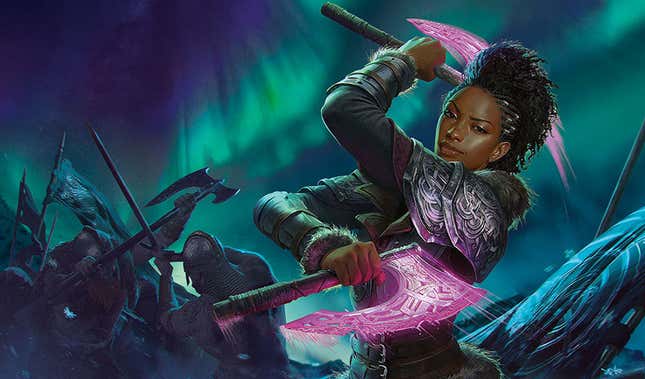
Ever since Jordan Peele gave us Get Out, there’s been a trend in pop culture entertainment that upsets the shit outta me—everything (and oh my Lord, do I mean everything) is centered on Black Pain. It feels like the only shows or movies that prominently feature Black people involved in fantastical or heroic shit has to feature Black Pain: HBO’s Watchmen and Lovecraft Country, Amazon’s Them, Netflix’s new movie Two Distant Strangers, even The Falcon and The Winter Soldier couldn’t resist making a “Black guy getting unjustly harassed by the cops” reference (even if it is quickly subverted). Y’all, I gotta say (again) I’m tired of it, and desperate for something in which there are hella Black people doing weird, awesome, heroic, and magical shit, without needing to deal with the baggage of racism. In my search for such a thing, I’ve hit upon an unlikely ally: Magic: The Gathering.
I love stories and lore. I especially love the stories for the kind of games nobody plays for the story— games like Battlefield, Call of Duty, Overwatch, and, obviously, Magic: The Gathering. I am also extremely attracted to high fantasy. Big robes, big spells, elves and wizards—I eat that shit up with a spoon and ask for seconds. And if it’s Black people in big robes, casting big spells, or featured as elves or wizards, it’s a big “hell yes” for me. But as you can imagine, there hasn’t been very much intersection between Black and high fantasy in pop culture. There are a plethora of books to be sure, like the Binti trilogy and the Earthsea novels, but whenever it’s high fantasy in TV, movies, or video games, Black people either get left out entirely or are seen but barely heard.
Magic: The Gathering manages to combine my three favorite things into one: esoteric lore, Black and Brown people just vibing, and a whole lotta magic. I’ve been having a great time going back and reading the stories for past card sets on Magic: The Gathering’s website.
I really liked the Return to Dominaria set from 2018. Dominaria’s overall story is kinda ho-hum. Basically there are a few separate plot threads about a magical skyship, a cabal of demons, and assembling a crack team of individuals to take on an impending threat. But contained within that larger story is a much smaller one featuring one of Magic’s coolest Black characters, Teferi.
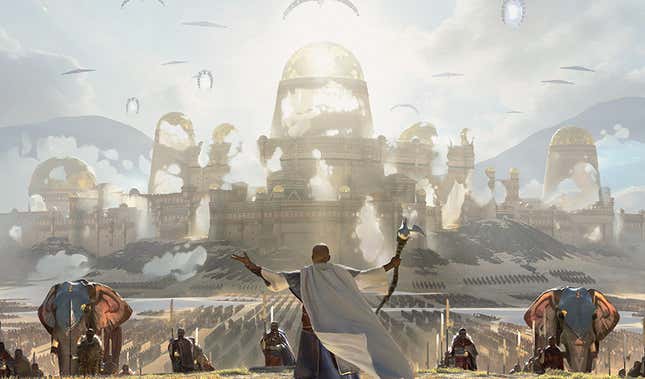
Teferi is a Planeswalker, the “main characters” of Magic’s story who have the unique ability to travel between worlds. When we meet Teferi in Return to Dominaria, he’s lost the ability to Planeswalk, and he’s trying and failing to crack open a tomb filled with traps and puzzles with his grown daughter, Niambi. His story manages to weave in elements like the joys of fatherhood and the regrets of his past into this Indiana Jones-type action adventure filled with time spells instead of cultural graverobbing. There’s no racism or weird racism allegory, and these characters, through their names like Niambi that evoke African-ness and the clothes they wear in card art, are still culturally identifiable as Black. Reading Teferi’s story in Return To Dominaria gave me this feeling of “this is what I’ve always wanted” in stories that feature Black people, and it makes me wonder why storytellers in TV and video games seem to lack Magic’s imagination.
Amonkhet, the ancient Egyptian-themed set from 2017, was an enjoyable if grim story. Basically, Nicol Bolas, an all powerful elder dragon, shows up, kills everyone old enough to walk, and uses his powerful magic to re-order society into a zombie army factory Bolas will use to take over Magic’s multiverse. Despite the obvious cheerfulness, I was really drawn to the stories of Amonkhet’s gods and people. I love a story that has ordinary people overcoming impossible odds or succeeding despite utter devastation.
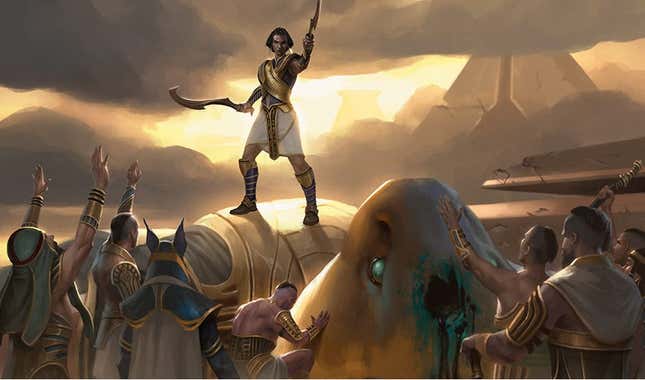
Samut, a Black woman, showed tremendous courage in questioning the true purpose of her society’s culture. Despite being branded as a heretic and abandoned by her friends, she is determined to bring the truth of her world to light. And when Bolas returns to pick up his zombie army and lay waste to the rest of the living inhabitants, she uses all the power and training instilled in her through Bolas’ machinations to fight against him.
Amonkhet is filled with little such stories of ordinary individuals overcoming horrific destruction, death, and the literal loss of their faith to survive and save others. It’s doubly pleasing because the powerful people—the ones who had the ability to stand up to Bolas—get their shit utterly wrecked. I know it’s weird to talk so highly of a story that still features Black people in pain, but unlike the earlier examples, these people are not in pain because of their Blackness—Nicol Bolas just sucks.
Kaldheim is another favorite but for far simpler reasons. There’s always a loud and wrong contingent of people who yell about “historical accuracy” whenever people bring up the lack of people of color in their fantasy media. Dragons can exist, but a Brown person strains credulity. Kaldheim is the viking-themed world of Magic’s multiverse. Its story stars a Black woman with a fro-hawk, dual-wielding magical viking axes. Enough fucking said.
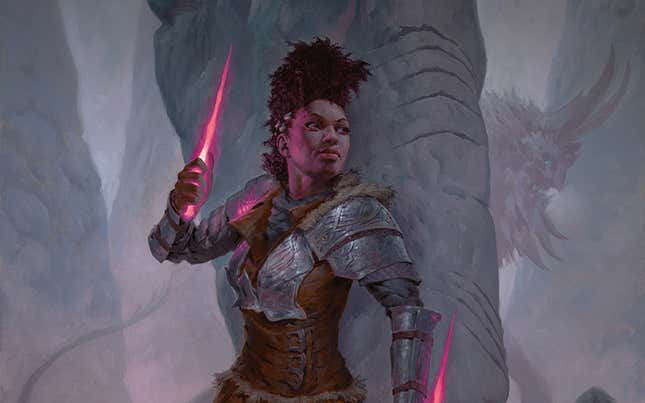
Magic’s story isn’t always the perfect panacea. Magic is the story of multiverses in which there are infinite worlds where literally anything is possible, and yet the writers still rely on old tropes based in racist histories that are better left behind. The Ixilan set features a culture of dinosaur-riding Meso-American people, but instead of letting the story focus on the awesomeness of that previous phrase—dinosaur-riding Meso-American people—those people are locked in a constant battle with vampire conquistadores. It’s a little on the nose that the genocidal European conquistadors of our reality were turned into a fantasy race of supernaturally pale people who cannot survive without drinking the lifeblood of others, but they really didn’t need to be there. Ixilan featured plenty of conflict without them.
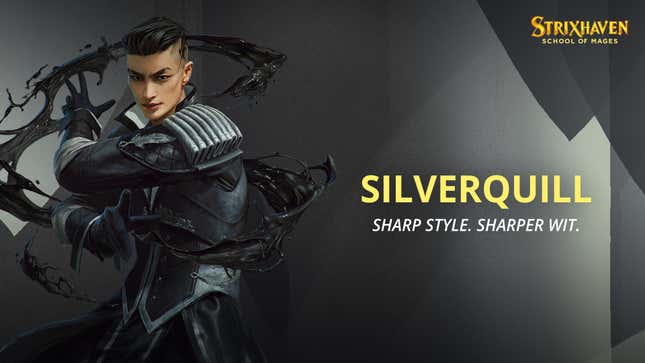
Magic’s newest set, Strixhaven—set in a Hogwarts-like magical academy—has run into problems with fans for its troublesome reliance on Asian stereotyping. One of Strixhaven’s students, Killian Lu, struggles under a domineering parent and labors to exceed the almost impossible expectations placed on him. Fans online have spoken out against Magic’s characterization of Lu, decrying the use of tired Asian stereotypes like the hyperfocus on honor and the model minority myth. It’s upsetting to see this story crop up during a nationwide spike in anti-Asian hate crimes and so soon after the killings in Atlanta. It’s especially upsetting considering Magic already has other Asian characters whose stories center their identities as Asian people but don’t revolve around stereotypes. Magic’s story is uniquely designed to feature a wealth of different people, cultures, and identities in a time and space in which the stereotypes and racial trauma that plague those identities do not have to exist. I hate that what it gets right for me, it fails at with others. I want everyone to feel what I felt reading Return To Dominaria, Amonkhet, and Kaldheim.
Fantasy stories can hold a mirror to our reality and speak truth to power—that’s what was so powerful about Get Out. It can be cathartic—there’s an episode in Lovecraft Country in which a Black woman takes a potion that makes her white and uses it to get a job she’s coveted but could never get because of her Blackness. But the most powerful episode of that series was “I Am”, when the show left all its “racism morality play but make it cthulhu horror” premise behind to follow one Black woman’s journey from fantasy world to fantasy world. Magic: The Gathering’s story is literally built on that premise, and I’m glad its creators, at times, use that story to say that sometimes it’s okay to just leave the bullshit behind.